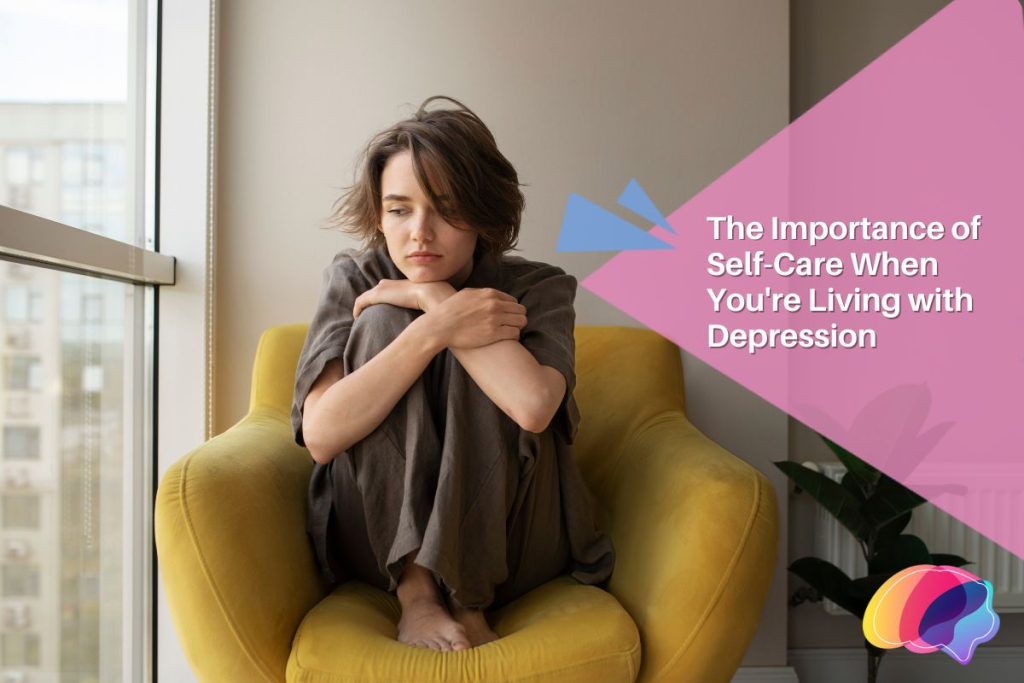The importance of self-care in managing depression cannot be understated. Depression is one of the most common mental illnesses, with an estimated 280 million people living with it globally. It can have a devastating impact on quality of life if left untreated and has been known to lead to thoughts of suicide or even attempts.
Self-care activities can improve overall well-being and make it easy to manage depression symptoms. It can also aid in recovery by providing a sense of control over your mental health. Self-care is about taking care of yourself, listening to your body, and setting boundaries that work for you.
Understanding the Link Between Self-Care and Depression
Depression is a serious mental health condition that affects an individual’s physical, psychological, and social well-being. It can cause extreme sadness, hopelessness, fatigue, and low self-esteem. Physiologically, depression can lead to changes in sleep patterns and appetite fluctuations. In addition, those suffering from depression may experience difficulty concentrating or making decisions.
A lack of self-care can make depression symptoms worse. Self-care can be an important part of a depression treatment plan. It includes exercise, healthy eating, mindfulness meditation, and positive self-talk. When practiced regularly, these activities can help to alleviate some of the less common symptoms associated with depression and improve overall mental health. Also, by taking care of oneself, individuals may better cope with the stresses that can contribute to depression.
When managing depression, experts recommend establishing a self-care routine that works best for you. This should include exercise, healthy eating, mindfulness, and meditation. Individuals can also benefit from positive self-talk or activities that make them feel good, like walking in fresh air to overcome negative emotions.
Exercise is a key component of any self-care plan as it releases endorphins. These hormones improve mood and reduce stress. Aim to get at least 30 minutes of moderate activity five times per week. You should also focus on personal hygiene and getting a good night’s sleep to lessen the symptoms of depression and boost positive thinking.
Eating healthy meals and snacks is important for optimal health, as malnutrition can worsen depression. Add leafy greens, lean proteins, healthy fats, and complex carbohydrates to your diet. Limiting processed foods and sugary snacks can also help to promote better mental health.

Mindfulness meditation can be a helpful tool to fight depression by helping individuals observe their thoughts without judgment or being overwhelmed by them. Start small and practice for just five minutes a day. You can also combine mindfulness meditation with breathing exercises to help reduce stress and anxiety.
Finally, positive self-talk is an essential part of any self-care routine. It involves recognizing negative thoughts and replacing them with positive or empowering statements. It helps you develop positive qualities to avoid feeling depressed. A mental health professional can help individuals learn how to create healthy thought patterns to benefit their mental health. They will help you build a supportive network by helping you improve relations with friends and family and even suggesting you join support groups for better treatment.
The Importance of Self-Care for Depression
It’s important to recognize the role that self-care plays in managing depression. Self-care includes making healthy lifestyle choices, exercising regularly, eating nutritious foods, getting plenty of sleep, and developing strategies for managing stress.
Physical Benefits:
Practicing self-care when dealing with depression can offer a lot of physical benefits. It can notably boost energy levels, restoring the consumed mental and physical reserves that depression can drain.
Incorporating self-care routines, such as regular exercise and a balanced diet, promotes better sleep patterns, enhancing the quality and duration of restorative sleep.
This, in turn, promotes improved overall health by reducing inflammation, strengthening the immune system, and positively impacting hormonal balance. Engaging in self-care becomes a powerful ally in the battle against depression, not only for the mind but for the body’s vitality and well-being.

Emotional Benefits:
Engaging in self-care can also bring emotional benefits for those dealing with depression. Taking time to nurture and care for oneself helps to reduce feelings of sadness, hopelessness, and helplessness that often accompany depression.
It allows individuals to reflect on and reconnect with their needs and desires, restoring a sense of control and purpose. Building resilience to stress through self-care can also help prevent relapse into depression.
And most importantly, it promotes feelings of self-worth and self-esteem, allowing a person to feel valued and accepted within their skin. Self-care practices become a powerful tool in the fight against depression by providing emotional stability and comfort during difficult times.

Cognitive Benefits:
It’s also important to recognize the cognitive benefits of self-care for individuals dealing with depression. Self-care activities, like mindfulness meditation and positive self-talk, allow individuals to be more aware of their thoughts and feelings.
This can help reduce negative thought patterns, improving focus and concentration. Furthermore, engaging in activities challenging the mind, such as reading and puzzles, can help foster better problem-solving skills.
Self-care activities develop mental resilience and provide an opportunity to practice better-coping strategies, enabling individuals to control their thoughts and feelings.

10 Self-Care Tips When You Have Depression
Self-care is important for managing depression, and research has made mental health professionals confident in its ability to help those who struggle with the illness. Here are some tips to get you started:
1. Guided Imagery: Try guided imagery exercises where you close your eyes and imagine a peaceful, serene place. Imagine the sights, sounds, and sensations in clear detail. You can find guided imagery recordings or apps to assist you.
2. Journaling: Set aside a dedicated time each day to write down your thoughts and feelings. It could be as simple as a gratitude journal, where you jot down things you’re thankful for, or a more comprehensive diary to explore your emotions and triggers.
3. Positive Self-Talk: Challenge and reframe negative thoughts. For example, if you think, “I can’t do anything right,” counter it with, “I’m capable and can learn from my mistakes.” This shift in self-talk can be transformative.
4. Mindfulness Practices: Start with mindful breathing. Take a few minutes to focus solely on your breath, paying attention to each inhale and exhale. Mindfulness apps and classes can guide you through more advanced techniques.
5. Exploring New Hobbies: Consider activities you’ve always been curious about. If it’s painting, purchase some basic supplies and start experimenting. Trying new things can inject excitement and purpose into your life.
6. Rethinking Relaxation: Experiment with relaxation techniques to discover what works best. Progressive muscle relaxation involves tensing and releasing different muscle groups. Meditation apps like Headspace can also guide you.
7. Sleep Routine Revamp: Establish a consistent sleep schedule by going to bed and waking up at the same time each day. Limit screen time before bed, create a calming bedtime routine, and ensure your sleeping environment is comfortable.
8. Physical Activity: Start with simple exercises like walking or yoga. Even short bursts of activity can have a positive impact on mood. Find an activity you enjoy to make it a sustainable habit.
9. Advocating for Yourself: Practice assertiveness by expressing your needs and boundaries clearly but respectfully. For instance, if socializing drains your energy, kindly decline invitations when necessary to preserve your mental health.
10. Dietary Changes: Incorporate mood-boosting foods, such as fatty fish rich in omega-3s, whole grains, and leafy greens. Reducing caffeine and sugar intake can also stabilize mood swings.
Remember, self-care is highly individualized. What works for one person may not work for another, so exploring and adapting these practices to fit your unique needs and preferences is essential.
Additionally, seeking professional help and support from a therapist or counselor can complement these self-care strategies when managing depression.

Overcoming Barriers to Self-Care
People with depression often struggle to care for themselves due to multiple reasons. Some of these include:
Lack of Energy: Depression often lowers energy, overwhelming even simple tasks.
Negative Self-Talk: Persistent self-criticism and pessimism can worsen depression.
Social Isolation: A tendency to withdraw from social activities and relationships can lead to further loneliness and despair.
Difficulty Concentrating: Depression can impair concentration and memory.
Stigma and Misunderstanding: Societal stigma surrounding mental health can hinder seeking help.
With such barriers, you might feel like you’re being set up for failure before you begin your self-care journey. However, it’s important to understand that these obstacles can be overcome with the right strategies and approaches.
Strategies to Overcome These Challenges:
Start Small: Break tasks into smaller, manageable steps to combat low energy levels and build a sense of accomplishment.
Challenge Negative Thoughts: Engage in cognitive-behavioral therapy (CBT) techniques to identify and reframe negative self-talk.
Connect with Support: Reach out to trusted friends or family members for emotional support, or consider joining a support group.
Develop Routines: Create structured daily routines to improve focus and maintain stability.
Seek Professional Help: Overcome stigma by recognizing that seeking therapy or counseling is a sign of strength and a crucial step toward recovery.
Getting Treatment for Depression at Lucid Wellness Center
Discover a comprehensive resource for depression treatment at Lucid Wellness Center. Take charge of your mental health and explore the transformative benefits of Transcranial Magnetic Stimulation (TMS) therapy. Our expert team is dedicated to providing personalized and effective care, offering hope to individuals with treatment-resistant depression. Don’t wait to find relief and lasting improvement in your well-being. Schedule a consultation with our board-certified psychiatrist today and embark on a journey toward a more fulfilling life with TMS therapy. Contact us today at (323) 792-2071 or [email protected] to learn more.
Frequently Asked Questions (FAQs) about The Importance of Self-care When You Have Depression
What Is the Importance of Self-Care in Mental Health?
The importance of self-care in mental health cannot be overestimated. Self-care activities allow individuals to take control of their thoughts and feelings by providing an opportunity to practice better-coping strategies, develop mental resilience, and foster better problem-solving skills.
Why Is It Important to Care About Depression?
It’s important to care about depression as it can have a serious impact on individuals and their family members. Depression is often misunderstood or stigmatized, so it’s important to educate oneself about the condition and support those struggling. Treatment is available for depression, so it’s critical to seek professional help if needed.
How Do People With Depression Take Care of Themselves?
People with depression can care for themselves by engaging in activities promoting mental, physical, and emotional well-being. This can include exercising regularly, connecting with supportive people, journaling, practicing mindfulness, exploring hobbies, and making necessary lifestyle changes such as getting enough sleep or eating nutritious foods. Additionally, individuals may find it helpful to seek professional help from a therapist.
How Does Self-Care Reduce Anxiety and Depression?
Self-care activities can reduce anxiety and depression by allowing one to practice healthier coping strategies, gain control over one’s emotions, and create balance in life. Examples of self-care include engaging in physical exercise, connecting with supportive people, journaling, exploring hobbies, practicing mindfulness techniques, and taking breaks from work or school when necessary.
What Are the Needs of People With Depression?
People with depression often need validation, understanding, and support. It’s important to recognize that each individual’s experience of depression is unique and complex; therefore, it’s essential to meet them where they are without judgment or assumptions. Additionally, it can be helpful to provide resources or referrals for professional help if needed.
How Depression Can Affect the Self-Motivation of the Individual?
Depression can affect an individual’s self-motivation due to a lack of energy, difficulty concentrating, and persistent negative thoughts. This makes it difficult to engage in activities or set and achieve goals. Focusing on small, achievable tasks and utilizing self-care strategies such as mindfulness or exercise is important to get back on track. Additionally, seeking professional help can be beneficial in tackling depression-related motivation issues.
How Can I Motivate Myself to Practice Self-Care When I’m Feeling Extremely Low?
When feeling extremely low, it can be helpful to use what is called “micro-goals.” This means breaking tasks into smaller components and focusing on completing one step at a time. Connecting with supportive people and taking breaks from work or school may also help.
Sources:
Gavurova, B., Popesko, B., Ivankova, V., & Rigelsky, M. (2022). The Role of Self-Care Activities (SASS-14) in Depression (PHQ-9): Evidence From Slovakia During the COVID-19 Pandemic.Frontiers in public health, 9, 803815. https://doi.org/10.3389/fpubh.2021.803815
Chand SP, Arif H. Depression. [Updated 2023 Jul 17]. In: StatPearls [Internet]. Treasure Island (FL): StatPearls Publishing; 2023 Jan-. Available from: https://www.ncbi.nlm.nih.gov/books/NBK430847/
Pilkington, K., & Wieland, L. S. (2020). Self-care for anxiety and depression: a comparison of evidence from Cochrane reviews and practice to inform decision-making and priority-setting.BMC complementary medicine and therapies, 20(1), 247. https://doi.org/10.1186/s12906-020-03038-8
Ludman EJ, Peterson D, Katon WJ, Lin EH, Von Korff M, Ciechanowski P, Young B, Gensichen J. Improving confidence for self-care in patients with depression and chronic illnesses. Behav Med. 2013;39(1):1-6. doi: 10.1080/08964289.2012.708682. PMID: 23398269; PMCID: PMC3628828.
van Grieken, R. A., van Tricht, M. J., Koeter, M. W. J., van den Brink, W., & Schene, A. H. (2018). The use and helpfulness of self-management strategies for depression: The experiences of patients.PloS one, 13(10), e0206262. https://doi.org/10.1371/journal.pone.0206262
Mu, T. Y., Xu, R. X., Xu, J. Y., Dong, D., Zhou, Z. N., Dai, J. N., & Shen, C. Z. (2022). Association between self-care disability and depressive symptoms among middle-aged and elderly Chinese people.PloS one, 17(4), e0266950. https://doi.org/10.1371/journal.pone.0266950


